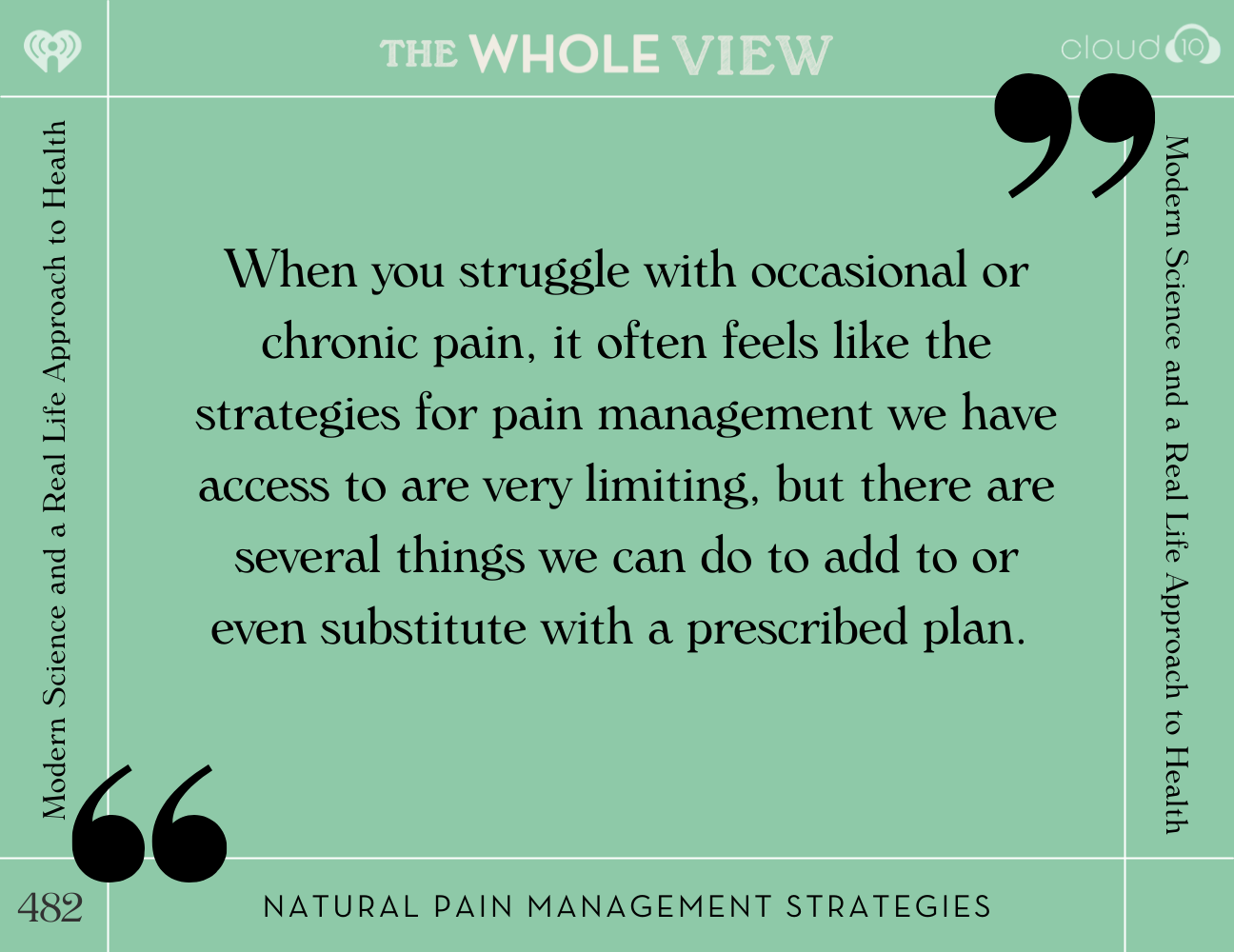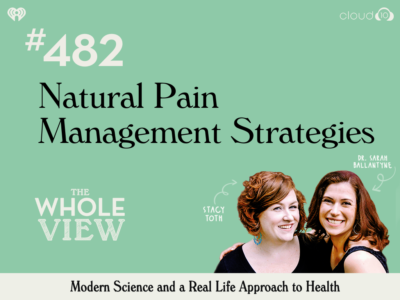On this episode of The Whole View podcast, Stacy and I review all of the helpful strategies for managing pain beyond NSAIDs. It is important to work with your doctor for the best strategy in your individual pain management scenario, however Stacy and I both have years of experience managing our chronic pain conditions and have discussed helpful resources in the past. There are several reasons to avoid NSAIDs if you have autoimmune disease as it can compromise gut health through several different mechanisms.
Table of Contents[Hide][Show]
Some of the helpful tactics that we go through include the amazing benefits of turmeric supplements (and reasons to be cautious about supplementing with the isolated ‘active’ turmeric component: curcumin), and the impact of CBD on pain. We also discuss the science of how sleep is protective against pain, and the amazing benefits of red light therapy (specifically the wavelengths offered by Joovv). Collagen is also unique in that it can be used for joint health in general, but does not offer the analgesic effects of pain management. In fact it addresses root causes and improves your health from the inside out! So there are definitely benefits to using it for long term management and pain prevention!
If you enjoy the show, please review it on iTunes!
Listener Question from Nicole
Hi Dr. Sarah and Stacy. My question is – how to begin the AIP without NSAIDs? I understand why removing them is critical – to recognize what foods and lifestyle components may drive inflammation. However, osteoarthritis is in both knees with the right one being bone on bone and in the cervical area, again with the right side being worse. Generally, I use Aleve for pain and if I don’t have to travel or go in the office, I either don’t use it or use one instead. But with job sites reopening, I have had to use them more frequently and I have a bit of travel for my job. Oh, I’ll also mention that at one point, my CRP level was 41 and at last test a couple of years ago, it was down to 19. So I’m open to any suggestions on how to better manage the health challenges so I can begin AIP properly. Thanks so much! – Nicole
Key Takeaways
- It is important to work with your doctor for the best strategy in your individual pain management scenario, however Stacy and Dr. Sarah both have years of experience managing our chronic pain conditions and have discussed helpful resources in the past.
- There are several reasons to avoid NSAIDs if you have autoimmune disease as it can compromise gut health through several different mechanisms.
- The most important thing we can do for pain management is get enough sleep! That’s because inadequate sleep increases pain sensation.
- However, it’s important to note pain can disrupt sleep. So, sometimes the first step to the snowball of badness is proper pain management!
- Dr. Sarah has three strategies to suggest for pain management: CBD, turmeric, and red light therapy. They work through different mechanisms and can also be combined.
- CBD (without THC) has been shown to reduce pain in sclerosis, spinal cord injury, brachial plexus injury, limb amputation, pain associated with kidney transplantation, fibromyalgia, and non-cancer chronic pain.
- Turmeric is rich in a phenol called curcumin, which has potent anti-inflammatory effects via inhibiting cyclooxygenase (COX)-2 that make it comparable to pharmaceutical NSAIDs. Curcumin can help restore the gut’s epithelial structure and reduce intestinal permeability, especially after an intestinal injury. In addition, some studies suggest it can counteract changes in the barrier function induced by a Western Standard Diet.
- Studies are showing red, and near-infrared light therapy can reduce pain caused by fibromyalgia, chronic back and neck pain, joint pain including from injury and arthritis (rheumatoid arthritis and osteoarthritis), orthodontic procedures, cancer, temporomandibular disorders, systemic sclerosis, sciatica, diabetic neuropathy, and burning mouth syndrome!
- For arthritis pain, a collagen supplement can be additionally helpful!
Recommended Reading and Listening
- TPV Podcast Episode 397: Practical Tips for the Sleep Stress Cycle
- TWV Podcast Episode 408: Insomnia?
- TPV Podcast Episode 399: What’s the Deal with Those Funny Amber Glasses?
- TPV Podcast, Episode 314: Is Melatonin Safe?
- TWV Podcast Episode 479: Stress, Coffee, Breakfast, and Walking.
- TWV Podcast Episode 420: CBD for Pain Management
- Turmeric: The Full Scoop
- TWV Podcast Episode 430: Collagen, Gelatin and Bone Broth, Oh My!
- Gelatin vs Collagen vs Bone Broth
Citations
Steinmiller CL, Roehrs TA, Harris E, Hyde M, Greenwald MK, Roth T. Differential effect of codeine on thermal nociceptive sensitivity in sleepy versus nonsleepy healthy subjects. Exp Clin Psychopharmacol. 2010 Jun;18(3):277-83. doi: 10.1037/a0018899.
Stroemel-Scheder C, Kundermann B, Lautenbacher S. The effects of recovery sleep on pain perception: A systematic review. Neurosci Biobehav Rev. 2020 Jun;113:408-425. doi: 10.1016/j.neubiorev.2020.03.028.
Roehrs TA, Harris E, Randall S, Roth T. Pain sensitivity and recovery from mild chronic sleep loss. Sleep. 2012 Dec 1;35(12):1667-72. doi: 10.5665/sleep.2240.










